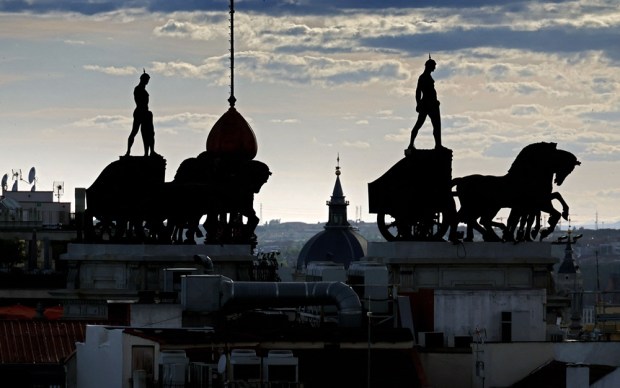What an eerie coincidence there was last week between Tony Abbott’s visit to Afghanistan, the virtual end of the war there and the proposal for the official vandalism of the Australian War Memorial.
First, the war. We tend to forget that our outrage at the monstrous regime of the Taleban did not start on 11 September 2001, but grew steadily in the months leading up to that day of infamy. If we can put a rough date on it, our real revulsion at the Taleban took shape in March 2001 when, under the orders of Mullah Omar, Taleban fanatics dynamited and destroyed the statues of the sixth-century Buddhas of Bamiyan in central Afghanistan on the ground that they were idols and, in a nod to evil western technology, filmed the whole tragedy. In the name of a violent religion, religious monuments were thus destroyed, a piece of national and world history was obliterated and the followers of the peaceful Buddhist religion were deeply hurt. It was our abiding outrage at the Taleban that took us to Afghanistan and the war for democracy and civilisation we hoped we could win, despite the failure of decades of military adventure by the British and the Russians. We even became keen on the war and, as Obama, Rudd and Gillard supported it, Afghanistan became in the eyes of the cognoscenti the ‘good’ war, as opposed to the ‘bad’ war in Iraq of Bush and Howard. Fast forward to late 2013 and Tony Abbott makes his historic visit to Afghanistan to recognise our valiant troops, the end of their mission, their sacrifice and achievement and also to put a historic marker in the ground by noting that we did not win or lose the war, but that we have given the Afghans a chance to build something for themselves in relative peace.
But, coinciding with this significant event came the news that far from the killing grounds of Afghanistan, plans had been made for an act of local desecration at the Australian War Memorial in Canberra. For reasons not yet explained and which seem inexplicable, it appears that the Council and the management of the memorial had conceived a plan to take a chisel to the Tomb of the Unknown Soldier, one of the most significant of national monuments and one with immense religious significance, and to obliterate from it the two invocations ‘Known Unto God’ and ‘He symbolises all Australians who’ve died in war.’ After Mr Abbott’s wise intervention and the usual compromise, ‘Known Unto God’ will remain, but the plan to remove the latter group of words will go ahead and in their place will be some words from a speech by the former prime minister Paul Keating. There is a chilling symmetry between these events; the obscene destruction of religious icons fuels our outrage at the perpetrators; our soldiers fight and some of them die to contribute to a better world; when their task is over and they prepare to come home, we commit an outrage on our own great monument and one invested with religious as well as national significance, especially for those for whom it is the burial ground of their fallen loved ones. You do not have to go to central Asia to find barbarians.
The insult to the humble people who have no other grave to visit is bad enough. But this act of vandalism — both the part conceived and abandoned, as much as the part still to be perpetrated under the ‘compromise’ — is an attack on one of our great institutions. Some of our institutions are intangible ideals and conventions, like the Crown, the Church, traditional marriage and the courts; true conservatives fight to protect them because we know they bind society together and keep it stable. Some institutions may look like bricks and mortar, but they also embody an ideal, like the War Memorial, for it is both a hallowed physical structure and the embodiment of Australian sacrifice for worthwhile ideals. A desecration of the physical structure is thus a desecration of the ideal behind it.
It therefore alarms me that those in charge of the memorial could be so bereft of an appreciation of the trust and responsibility they have been given that they should actually want to disfigure it. It alarms me that they could think the memorial was a suitable place to put up a divisive politician’s speech and, more precisely, a speech from a politician who has never made a bipartisan speech or one that was not designed to ridicule or abuse an opponent. They should be removed from office as it is apparent that whatever their understanding of their trust, they have abused it.
Our institutions are falling into disrespect because so many of those who can and should be defending them not only fail to do so but actually take part in their denigration. It is therefore up to individuals to do what they can to preserve them. So I am putting on my website a list of the Australian soldiers who died in Afghanistan. Someone, somewhere will see and remember at least one of their names. Their names are known, of course, but it is a fitting memorial to put at the top of the list the words they tried to obliterate at the Australian War Memorial, ‘Known Unto God’.
Got something to add? Join the discussion and comment below.
Get 10 issues for just $10
Subscribe to The Spectator Australia today for the next 10 magazine issues, plus full online access, for just $10.
You might disagree with half of it, but you’ll enjoy reading all of it. Try your first month for free, then just $2 a week for the remainder of your first year.














Comments
Don't miss out
Join the conversation with other Spectator Australia readers. Subscribe to leave a comment.
SUBSCRIBEAlready a subscriber? Log in